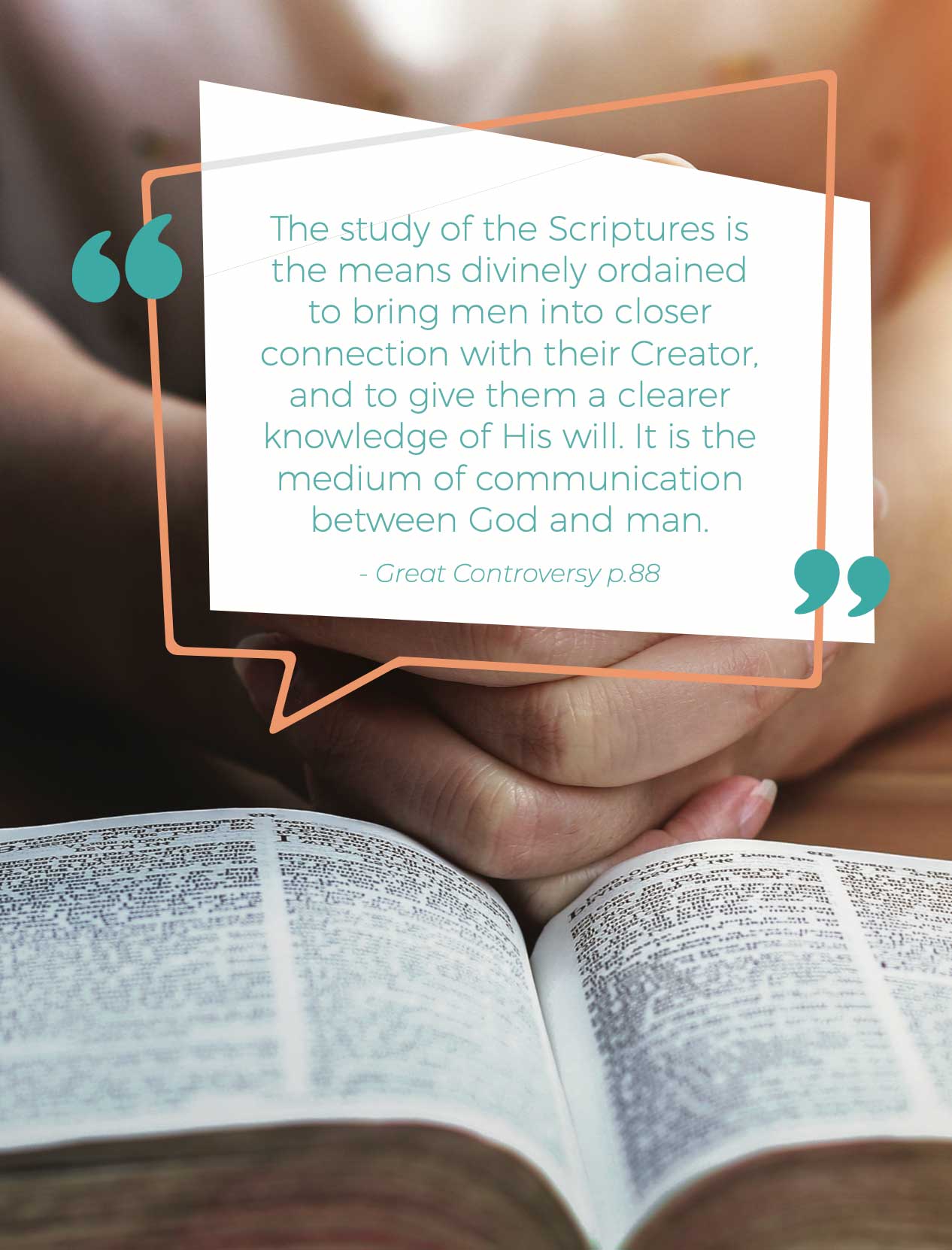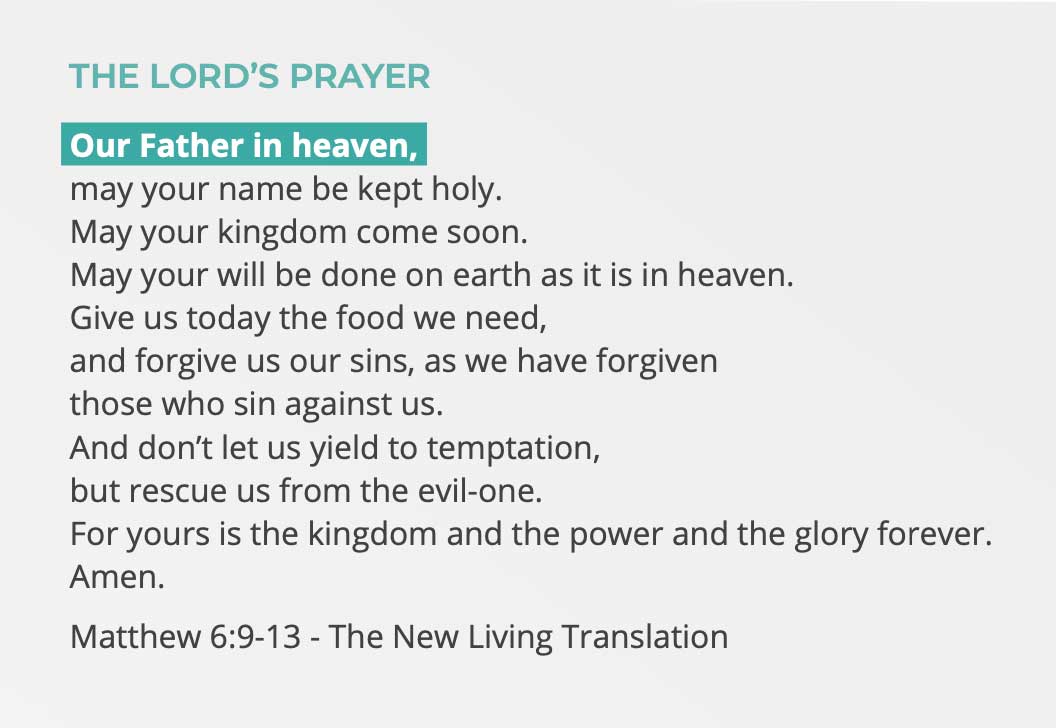
Who Am I Talking To?

WHO IS GOD?
Some people in our society are not sure if God exists.
And if he does, they wonder how he reveals himself and how he goes about answering our prayers.
It’s interesting that many people in developing countries rarely ask these questions.
They witness supernatural activity around them, and the reality of the spiritual world is a vital part of their culture.
It seems as though our sophisticated western world – our scientific way of looking at everything – seems to have filtered out any place for spiritual things.

MY STORY

The whole experience of prayer is based on the belief that there is someone outside of ourselves who is bigger and better than us, and that this someone can influence our life.
Who this someone is and what we know of him will affect how we pray to him and what we expect will happen when we pray.


Many Christians have tried to prove God’s existence by looking at design in everything that exists.
An example of this is our innate ability to differentiate between right and wrong.
These things may be effective evidence for a searching mind, but do not provide proof to the sceptical mind.
There will always be hooks on which people can hang their doubts.
The Bible, however, does not set out to prove God’s existence.
Without any apology, it is written on the basis that he does exist.
It calls for faith and trust. The Bible is the story of how God relates to us.
It shows how God revealed himself powerfully in history through experiences such as a great flood, events surrounding the deliverance of Israel from captivity in Egypt, episodes during the reigns of many kings, and countless miracles.
Many of the Bible’s authors – especially prophets in the Old Testament – have written down what God has communicated directly to them.
However, the greatest revelation that God exists is the way he stepped into history in the person of Jesus.
Without trying to prove anything, Jesus clearly claimed to be a revelation of God himself, saying –
Anyone who has seen me has seen the Father. John 14:9


It’s true to say, the question of God’s existence comes down to whether or not we believe Jesus’ claims about himself, and the supporting claims of the Bible.
The growing evidence of archaeology continues to provide confidence in the reliability of the Bible.
The Discovery course Digging Up the Past gives lots of evidence to confirm the reliability of the Bible.
The evidence of who Jesus was has led millions of Christians to believe that he is who he claimed to be.
The alternatives – that he was either deluded or knowingly set out to deceive people – do not make sense.
The circumstances of his birth, life, teachings, miracles, character, death, being raised to life again, and his visible return to heaven, are overwhelming.

TRY IT –
If you take the step of trusting what he says about himself and begin to talk to him in prayer, you’ll discover the reality of his existence by the way he reveals himself to you.
It happens differently for each one of us.
Some may experience a direct answer to their request.
Some may just feel a quiet sense of rightness forming about the issues they’ve brought to him.
You may even hear his soft voice speaking to your mind and heart.
So let’s focus now on the Lord’s Prayer, and see how Jesus talked to God.

DEVELOPING A RECEPTIVE HEART FOR PRAYER
It may come as a surprise that Jesus addressed God as Father.
It was in sharp contrast to the way most people thought of him under the teaching of the religious leaders of the day.
To them God was someone who required them to earn brownie points by doing good things before he would grant them approval or acceptance.
They very rarely called God Father. When they did, it carried a sense that God was remote and stern.
When Jesus called him Father, however, it was always with feelings of warm closeness and deep affection.
The word Jesus used for father
– Abba – was the equivalent of our – Dear Dad.
It shocked his hearers because they thought he was being too familiar with God.
Listen to another of Jesus’ prayers –
Father, I thank you that you have heard me. I know that you always hear me.
John 11:41-42
Get Involved –
What thoughts come to your mind when you think of God? List three that illustrate the way you think of him. For example – As a loving Father.

So ready, so eager, is the Saviour’s heart to welcome us as members of the family of God, that in the very first words we are to use in approaching God He places the assurance of our
divine relationship, “Our Father”.
– Mount of Blessing p.103
A Father Has Children
If God calls himself your Father, that means he is calling you his child.
That doesn’t imply you are childish.
It’s simply saying that, having brought you into existence, he cares for you and will supply your needs, much like earthly fathers do when their children are born.
Up until the time we call him Father, we often act like rebellious teenagers, rather than sons and daughters with a warm father-son or father-daughter relationship.
He desires us to receive him as Father, but that only happens when our hearts are open to do so.
Jesus expressed it well when he said –
To all who received him, to those who believed in his name, he gave the right to become children of God – children born not of natural descent, nor of human decision or a husband’s will, but born of God.
John 1:12-13
To receive God is very difficult for those who don’t know whether he even exists, or alternately, see him more as a hard slave master who requires them to rigidly obey a list of rules.
Sons and daughters relate to their fathers very differently to the way slaves relate to their masters who are cruel and abusive.
Maybe you do not feel like a son or daughter of God because he has been misrepresented to you, or you haven’t been introduced in this perspective of God as a father.
God takes a compelling step to tell us that we truly are his children when he says –
Those who are led by the Spirit of God are sons of God. For you did not receive a spirit that makes you a slave again to fear, but you received the Spirit of sonship.And by him we cry Abba, Father.
Romans 8:14-16

Get Involved –
By faith, have you received God as your Heavenly Father? If not, would you like to today?
GOOD FATHER OR BAD FATHER

It is a fact of life that not everyone has, or has had, a good father.
Because of this, it is almost inevitable that some find it difficult to relate to God when he calls himself Father.
If our dads were not present with us physically or emotionally as we were growing up, we will probably also feel the same towards God when he is thought of as Father.
Also, if our father was physically or sexually abusive to us, we may even have a deep unresolved anger towards him that is easily projected at God our Father.
It is for this reason that Jesus adds an important phrase after God’s name.
He is our Father in heaven. This makes a world of difference.
He is different to our earthly fathers, and it is important that we don’t dump on him those negative feelings we may bring over from childhood.
But many who have had a bad experience with their earthly father have found in God our Father all that a child looks for in a loving dad.
GET INVOLVED –
Is there anything about your relationship with your own father that you think may influence the way you regard God as your Father?
But if you call God your Father you acknowledge yourselves His children, to be guided by His wisdom and to be obedient in all things, knowing that His love is changeless.
– Mount of Blessing p.105

THERE’S NO MISTAKE – GOD SAYS CALL ME FATHER
And he will be called . . . Everlasting Father, Prince of Peace. Isaiah 9:6

God has a purpose in calling himself Father.
Rising out of our impressionable time of childhood, father is still a powerful image of God for us to experience.
God has his own way of revealing his Father’s heart to those who have been wounded by their childhood experiences.
When people become aware of the way the Father and his son Jesus relate to each other, the insight enables them to see just what sort of a father he really is.
Realistically, God is very different to our earthly fathers.
He is much better than we could ever imagine.
To address God as our Father in heaven, though, is not so much a focus on the place of his dwelling but on the authority and power at his command.
Everyone who seeks an audience with a king here on Earth is required to follow a set of formal rules and requirements in order to be admitted.
It is almost impossible to get through the tight security.
Thankfully, it is not like that with God.
To address God as our Father in heaven is the only thing needed to bring us into his presence in a right frame of mind to begin to talk with him in prayer.
GET INVOLVED –
When you pray, where do you picture God to be? How natural does it feel for you to pray?

BEING TOO CASUAL WITH GOD IS NOT RIGHT EITHER!
There is another reason why Jesus extended God’s title from our Father to our Father in heaven.
It balances any tendency to regard him as some sort of common human friend who can be manipulated if we are smart enough.
Jesus, in his introduction to the Lord’s Prayer, is saying that we need to keep two aspects of God’s nature in proper balance as we approach him in prayer.
He is certainly our Father, but we must also realise that he is awesome, powerful, and Creator of all, and that we are his creation.
He is the Almighty God who spoke every nebula of the infinitely vast universe into existence, and keeps every star and galaxy safely in motion through space.
Just think about it! If we were to get too close to the sun, we would all burn.
If we were too far away, we would all freeze.
Yet he created the sun at the right distance, and it keeps its fire and energy burning for our very survival.
At the same time he is the one who keeps our hearts beating every day, and holds the power of life and death in his hands.
He is our Father but he is also God Almighty.

He is our Father but he is also God Almighty.
God is not a tyrant similar to the ancient Greek gods who terrified people with their unpredictable behaviour and impulsive judgments.
God’s holiness and awesome power, however, means that we need a healthy respect as we approach him.
When he revealed himself physically and visibly in the Arabian Desert as he gave the Ten Commandments to Israel at the base of Mount Sinai, the Bible says that the whole nation quaked with fear.
They didn’t realise that behind his overwhelming glory he still loved them deeply. (See Exodus 20:18-19)
So there is a balance.
This awesome aspect of God’s nature must not override the reality that he is our Father and he wants to be close to us and enjoy our company.
He is a person – not an impersonal force.
He loves us with a passion that only begins to become evident to us when we ain some insight into the depth of pain he experienced in order to provide a way out of the mess that is in the world, and is often in our lives. (See Romans 8:31-39)
He wants us to draw near to him without fear because of what he has done for us in his Son Jesus. (See Hebrews 10:20 -22)
He longs to speak to us quietly in a soft voice, and guide us through our difficult situations and problems.
His greatest pleasure is to experience deep intimacy in his relationship with us.
These two aspects of God’s nature seem at opposite ends of the spectrum – great and mighty God – and our loving Heavenly Father.
But they are both true. The first reveals his power and the second his heart.

We need to keep them in balance as we come into his presence and talk to him in prayer. We must not reduce him to someone solely on our level, but we must not regard him as so remote that he is unapproachable. We can come to him with a real sense of awe, but not be overwhelmed in utter terror.
GET INVOLVED –
In what ways might you have been too casual with God?

WHOSE FATHER?
It is important to notice that we are asked to address God as our Father in heaven.
We are not alone as we approach him in prayer.
Firstly, Jesus invited us to pray our Father – not my Father, or Jesus’ Father.
If he said my Father, that would have left us out!
But because Jesus was God who became one of us – human – he identifies himself with us.
He is Jesus’ Father, and he is my/your Father too.
So that makes us brothers and sisters of Jesus!
So Jesus is not ashamed to call them brothers. Hebrews 2:11
So when we pray our Father, we link ourselves with Jesus and God in a beautiful family way.
Secondly, there are many other people living around us who also talk to God.
Because of this, there is much wisdom in coming into his presence as a group of people who have similar desires.
If you’re finding it difficult to pray to him, why not seek out someone else to pray with you?
It’s helpful, not only because we can gain true and rewarding friendships, but also because they can serve as sounding boards for us in our prayers.
In inviting us to pray with other people, God is showing his understanding of human nature. Left alone, we don’t always see things clearly.
We tend to see aspects of ourselves, others, the world around us, and God himself, inaccurately.
The old proverb says –
A cord of three strands is not quickly broken. Ecclesiastes 4:11-13
There is strength in praying together.
So with an open and receptive heart, we can always pick up things from listening to other’s in prayer that we may have missed in our own prayers.
This booklet should encourage you to gain confidence as you begin to talk to God in prayer.
A loving Father in heaven won’t block his ears when you come to him and share the concerns of your life.
What’s more, you can trust him, for he has the power to meet your situation, and the wisdom to do what is best for you.
So don’t stop with this booklet – keep going and move onto the next one.
You can be sure that as you continue to learn how to pray, your prayer life will become more meaningful and real to you.
GET INVOLVED –
List two people you would like to pray with in a group.
MY PRAYER –
My Father in heaven,
I believe that you are there
and that you hear me.
Please help me to understand you better. Amen

Prayer unites us with one another and with God. Prayer brings Jesus to our side, and gives to the fainting, perplexed soul new strength to overcome…
– Christ’s Object Lessons p.250.
